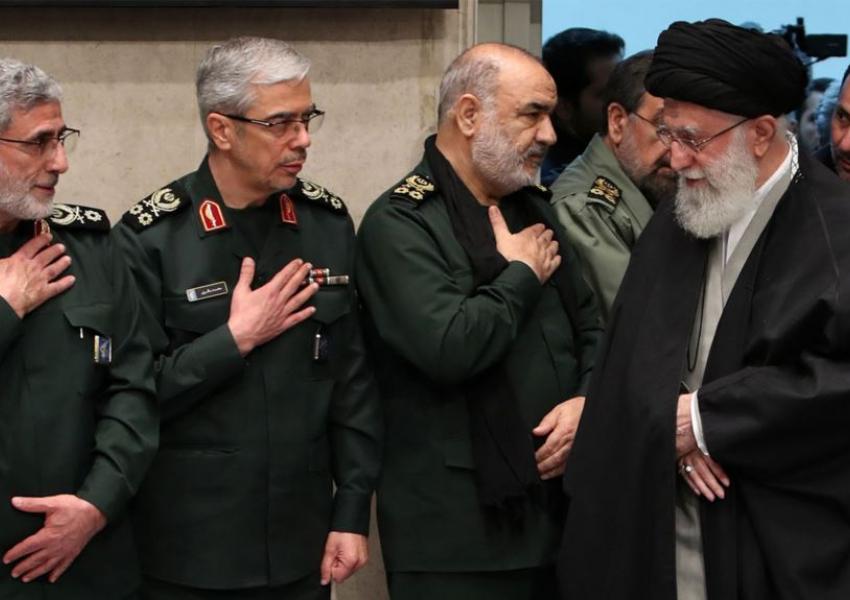
Iran Guards Suggest Tough Conditions For Talks With US
Iran International
Javan daily newspaper, which is affiliated to the Revolutionary Guards (IRGC), has put forward strict conditions for negotiations with the United States. Javan maintained that Iran’s 2015 nuclear deal with world powers “prevented Iran’s progress,” suggesting Tehran should not have accepted the limitations on Iran’s nuclear program required by the agreement.
This and other IRGC media commentaries on possible talks with the US might signal a move to establish a tighter control over future negotiations to protect its missile program and regional role from any horse trading with Washington.
On November 15, Javan newspaper wrote in a commentary that Iran should learn lessons from experience: “If there are going to be any talks about the nuclear program, first we need to make sure that they should be carried out in a way that there is a guarantee of the implementation of its results.”
Javan reminded readers that the 2015 deal, known as the JCPOA (Joint Comprehensive Plan of Action) “was an unpleasant experience as the US pull-out from the deal revealed that international accords and even UN resolutions are useless.” Even before the Trump administration in 2018 left the JCPOA, which had been endorsed by the United Nations Security Council, Tehran argued that Washington had failed to lift all the sanctions it had pledged to remove.
The Javan commentary insisted that the outcome of any talks should “further enhance Iran’s military power” and have “tangible impacts on the nation’s livelihood.” Such conditions repeat the policy of the Iranian leadership that Iran’s missile program not be included in any discussions and that Iran be offered substantial financial benefits, for example through access to assets frozen abroad.
In a move with the potential to complicate any negotiations, Sobhe Sadeq magazine, the IRGC’s official organ, has called for handing the lead role in nuclear talks back from the Foreign Ministry to the Supreme Council of National Security (SCNS), as was the case before 2013 when talks were led by SCNS secretaries, first Hassan Rouhani (1989-2005), who became president in 2013, and subsequently Ali Larijani (2005-07) and then Saeed Jalili (2007-13).
This might be designed to prevent or at least prolong negotiations. Officials in SCNS, such as the current secretary, the IRGC general Ali Shamkhani, could influence any talks and shape proposals presented to to Supreme Leader Ali Khamenei for approval.
The call to return the nuclear dossier to the SCNS is reminiscent of the years between 2002 and 2013, when one of Khamenei’s representatives on the council, the ultraconservative Jalili, effectively prevented any breakthrough. A review of the 2013 handover of the nuclear case to the Foreign Ministry shows that the IRGC accepted the handover with a heavy heart.
Iran’s leading economic daily Donya-ye Eqtesad wrote on November 17 that the calls made by the IRGC reflects concern over hopes expressed by senior officials including Rouhani for Washington to return to the JCPOA. Donya-ye Eqtesad also wrote that Iran and the US now had different expectations.
Sadeq Zibakalam, a reformist commentator, argued in a 17 November tweet against returning the central role to the SCNS on two grounds: “First is the council’s failure to further the negotiations when it oversaw the nuclear case. The talks under Jalili as Iran’s top negotiator only created an international consensus against Iran. The second point is that the Council is not accountable to anyone.”
During rounds of nuclear negotiations after 2013, Iran’s Foreign Minister Mohammad Javad Zarif and a deputy, Abbas Araghchi, often took part in debates in the Iranian parliament, answering questions from critics.
While Rouhani might like to see quick progress before he stands down as president with June’s election, thereby ending his tenure on a success note, it is more likely that any negotiations would start after August 2021 when new administrations are in place in both Iran and the United States. He may also look to continue his role on the SCNC, where he currently sits in his capacity as president.





